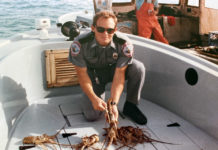In two months, Keys high school students wishing to play sports or be involved in extracurricular activities related to sports will have to consent to being randomly tested for drugs and alcohol.
The program would have gone into effect in fall 2017, but after Hurricane Irma, the Monroe County School Board did not think it feasible to start drug testing mid-year.
The board last month approved the program on a trial basis for one year, starting in August. The drug test does not check for steroids.
Dave Murphy, district director of assessment and accountability, said pending board approval at the June 12 meeting, the drug-testing program will be fine-tuned over the summer for its fall rollout. The exact cost has not been set yet.
Although it’s something he voted for, board Chairman Bobby Highsmith said the program is controversial.
“Our school district would be in the definite minority across the nation of schools implementing these programs,” he said. “However, given the requests coming from principals and athletic directors, people whose opinions I value greatly, I’m willing to try this on a one-year basis and see what effects, if any, this has on curbing teen drug or alcohol use as well as any peripheral effects regarding participation in sports and extracurricular activities.”
According to the district’s Interscholastic Athletics Alcohol and Drug Testing Policy, this is how it’ll go:
- WHO
High school student athletes and those involved in extracurricular activities related to sports, including but not limited to cheerleaders and members of the marching band.
- HOW
Students must consent to drug testing. No consent means no participation. This includes consenting to further random testing at any time “upon reasonable suspicion.” Coaches will submit their rosters, including student names and ID numbers, to athletic directors. Names are assigned a random number for testing by the district from the current rosters and entered into Microsoft Excel’s random generating program. Names and identities remain unknown until all the selections have been completed,
Athletic directors will run the random student selection process. On a testing day, up to 25 percent of student athletes will be randomly selected for a urine test.
The student is escorted out of the class by staff to the testing area. Coaches, athletic trainers, secretaries, and student aides will not be allowed to escort the student.
The student is alone when providing the sample.
- WHAT
Students are being tested for the following substances: alcohol, marijuana, methamphetamines, amphetamines, cocaine, ecstasy, opiates, phencyclidine (PCP), benzodiazepines, barbiturates, methadone, oxycodone and anti-depressants.
- RESULTS
Initially, there is an on-site screening of the sample. If positive, it’s sealed and sent to a lab. “A limited number of tests will be provided free of charge through our partnership with AHEC (Area Health Education Center Inc.). The exact costs of the program and number of tests will need to be re-evaluated since a year has lapsed since the policy was first approved,” Murphy said. “It is a law enforcement lab that will do the test, but no student name will be attached to a sample that’s sent down.”
Should there be a positive result, the lab will submit the positive drug or alcohol test result to the school’s athletic director, resulting in “appropriate action.”
- TESTING POSITIVE
If a student tests positive for a substance, the discipline is as follows:
- First infraction: Suspension from sport for 10 days, but required to attend and be sidelined at practice. After five school days, student can participate in practice.
No playing at scheduled games until providing documentation of a free three-hour state-licensed and accredited drug/alcohol counseling or rehab/education program.
- Second time: Student suspended from sport for 30 days. Practice allowed, observed from sidelines, and participation in practice allowed after 20 days. Three-hour drug/alcohol course required, along with subsequent school-based drug tests.
- Third time: Student is suspended from sports for the rest of the school year.


























